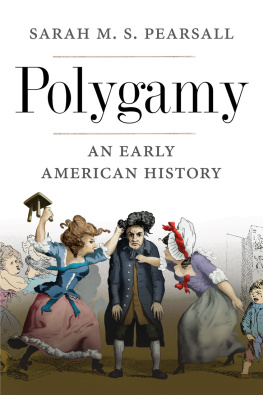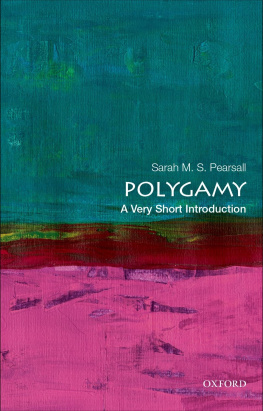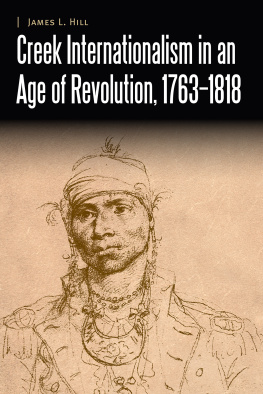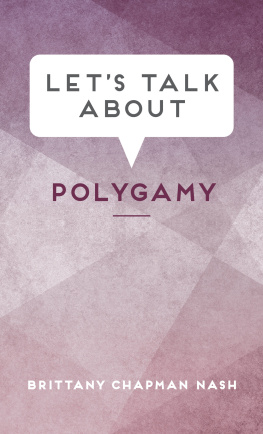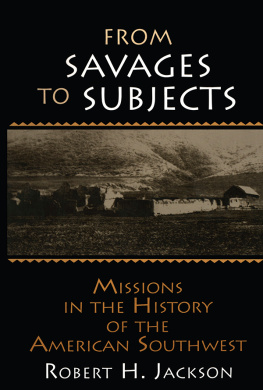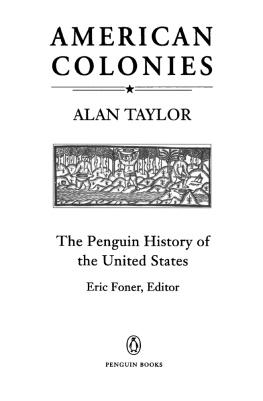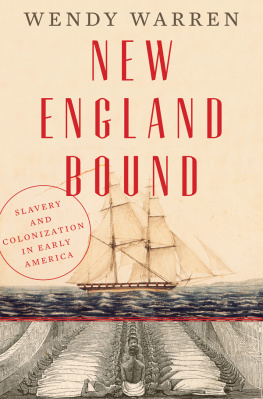Polygamy
Published in cooperation with the
William P. Clements Center for Southwest Studies
Southern Methodist University

Published with assistance from the income of the Frederick John Kingsbury Memorial Fund.
Published with assistance from the Annie Burr Lewis Fund.
Published with assistance from the foundation established in memory of Calvin Chapin of the Class of 1788, Yale College.
Copyright 2019 by Sarah M. S. Pearsall.
All rights reserved.
This book may not be reproduced, in whole or in part, including illustrations, in any form (beyond that copying permitted by Sections 107 and 108 of the U.S. Copyright Law and except by reviewers for the public press), without written permission from the publishers.
Yale University Press books may be purchased in quantity for educational, business, or promotional use. For information, please e-mail (U.K. office).
Set in Fournier MT type by IDS Infotech Ltd.
Printed in the United States of America.
Library of Congress Control Number: 2018962621
ISBN 978-0-300-22684-3 (hardcover : alk. paper)
A catalogue record for this book is available from the British Library.
This paper meets the requirements of ANSI/NISO Z39.48-1992 (Permanence of Paper).
10 9 8 7 6 5 4 3 2 1
To Teddy
Men and women find universally, (however the fact may be concealed,) that their susceptibility to love is not burnt out by one honey-moon, or satisfied by one lover. On the contrary, the secret history of the human heart will bear out the assertion that it is capable of loving any number of times and any number of persons, and that the more it loves the more it can love. This is the law of nature, thrust out of sight, and condemned by common consent, and yet secretly known to all.
John Humphrey Noyes, Bible Argument
Contents
Acknowledgments
This work hath taken up more than twelve years. What a length of time, and painful drudgery, to make yourself at the last stage of life ridiculous! So smirked James Penn, a 1781 critic of a book about polygamy in Remarks on Thelyphthora. This work did not take quite that long, and I hope Im not yet at the last stage of life. Still, many individuals and institutions contributed to making the research and writing of this book a great joy, with only occasional painful drudgery. Im delighted to thank them here.
Ive been lucky to be able to rely on generous financial support. A British Academy Small Grant was critical in allowing me to pursue research in early stages. I also benefited greatly from a year of leave supported by a National Endowment of Humanities Long-Term Fellowship at the Newberry Library; a term of leave supported by the Centre for Research in the Arts, Social Sciences, and Humanities (CRASSH) at Cambridge University; and another year of leave from a senior fellowship at the Clements Center for Southwest Studies at Southern Methodist University. Cambridge University History Faculty also helped with sabbatical as well as sustaining research support. Thanks especially to Tony Badger and Gary Gerstle, both Paul Mellon Professors of American History; Lawrence Klein, chair of the History Faculty; and Phil Allmendinger, head of the School of Humanities and Social Sciences, all at Cambridge University.
The musty air of libraries and archives is to me intoxicating, a gateway to new worlds. For supplying me with my fix, I thank many institutions and the helpful staff in them. I have relied on two great British library systems: those at Cambridge University and Oxford University. In the Chicago area, I relied on the extraordinary Newberry Library (and its Illinois Interlibrary Loan system), as well as Northwestern Libraries. I also used repeatedly the rich collections at Yale University, especially the Beinecke Rare Book and Manuscript Library, and Harvard University, especially Houghton Library. The staff at the well-stocked Southern Methodist University libraries were unfailingly sweet, and I thank Russell L. Martin III in particular for pointing me in the direction of some key texts at the DeGolyer Library. I also appreciated the interlibrary loan system there. Other wonderful repositories for material included the John Wesley Powell Library of Anthropology at the Smithsonian; the Archivo General de Indias; the British Library; the National Library of Scotland; the John Carter Brown Library at Brown University; the state archives for Massachusetts, Connecticut, and New Hampshire; the Boston Public Library; the Merrimack County Probate Department; Connecticut Historical Society; Swem Library, William and Mary College; the Virginia Baptist Historical Society at the University of Richmond (and many thanks to Lori Gates Schuyler for arranging my stay there); Glasgow University Archives; and the LDS Church History Library, Church of Jesus Christ of Latter-day Saints. I have also benefited from numerous online and electronic databases. I am also grateful for permission to republish some of the material found in two articles: Having Many Wives in Two American Rebellions: The Politics of Households and the Radically Conservative, American Historical Review 118, no. 4 (October 2013): 10001028, and Native American Menand Womenat Home in Plural Marriages in Seventeenth-Century New France, Gender and History 27, no. 3 (November 2015): 591610.
I have also been so delighted with the insights of audiences, as well as genial hosts, at many institutions at which I have presented material. In the United States, I have gained much from lectures at the University of Utah, Yale University, the University of CaliforniaBerkeley, Southern Methodist University, and the University of Alabama, as well as at the Washington, D.C., Early American Seminar; the American Origins Seminar, Early Modern Studies Institute at the University of Southern CaliforniaHuntington Library; the Rocky Mountain Early American Seminar; the Boston Area Early American History Seminar; the Newberry Library Early American History Seminar and the Fellows Seminar; and the Omohundro Institute of Early American History and Culture Colloquium. Special hats off to Andy Graybill, Heather Kopelson, Eric Hinderaker, Robin Einhorn and Mark Peterson, David Blight, Rick Bell and Holly Brewer, Peter Mancall and Carole Shammas, and Ron Hoffman. In the United Kingdom, I thank seminar organizers, and participants, at the University of East Anglia; the Institute of Historical Research, University of London; Nottingham University; Sheffield University; Warwick University; Oxford University (Rothermere American History; Eighteenth-Century British History; and From Restoration to Reform); and Cambridge University (World History; Multidisciplinary Gender Studies; Comparative Social and Cultural History; American History; The Eighteenth Century). I appreciate comments from students and others at History Society talks at Murray Edwards, Robinson, and Gonville and Caius Colleges at Cambridge as well as the History Society at the North London Collegiate School, lectures to sixth-form students at Robinson, and the Cambridge Rotary Club. I also gained much from presenting at lUniversit Paris 7 Diderot, so thanks to Marie-Jeanne Rossignol. Dr. Charlotte Lerg, my impressive former undergraduate, sent a timely invitation to speak at the Westfalische Wilhelms-Universitt Mnster, where a great audience welcomed me. She and her mother, Sabine, also arranged a special tour of Stadtmuseum Mnster with Dr. Bernd Thier, from whom I learned a great deal about the (Ana)Baptists.
To enter so many areas new to me, as I have in this book, has been an engrossing but daunting challenge. I could not have managed it without the insightful, expert readings of individual chapters by these generous colleagues: Seth Archer, Juliana Barr, Kathleen DuVal, Amy Erickson, Sylvia Frey, Kathryn Gleadle, Sarah Barringer Gordon, Emma Griffin, Joel Isaac, Margaret Jacobs, Daniel Livesay, Rowena McClinton, Margaret Newell, Matthew OHara, Benjamin Park, Dylan Penningroth, Ann Marie Plane, Bianca Premo, Edward Rugemer, Brett Rushforth, Elena Schneider, Susan Sleeper-Smith, Christina Snyder, Laurel Thatcher Ulrich, Lee Palmer Wandel, Ruth Watson, and Elizabeth Wright. Brian DeLay not only read the whole manuscript but did so with his trademark combination of critical brilliance and generous encouragement. I am abidingly grateful.
Next page
